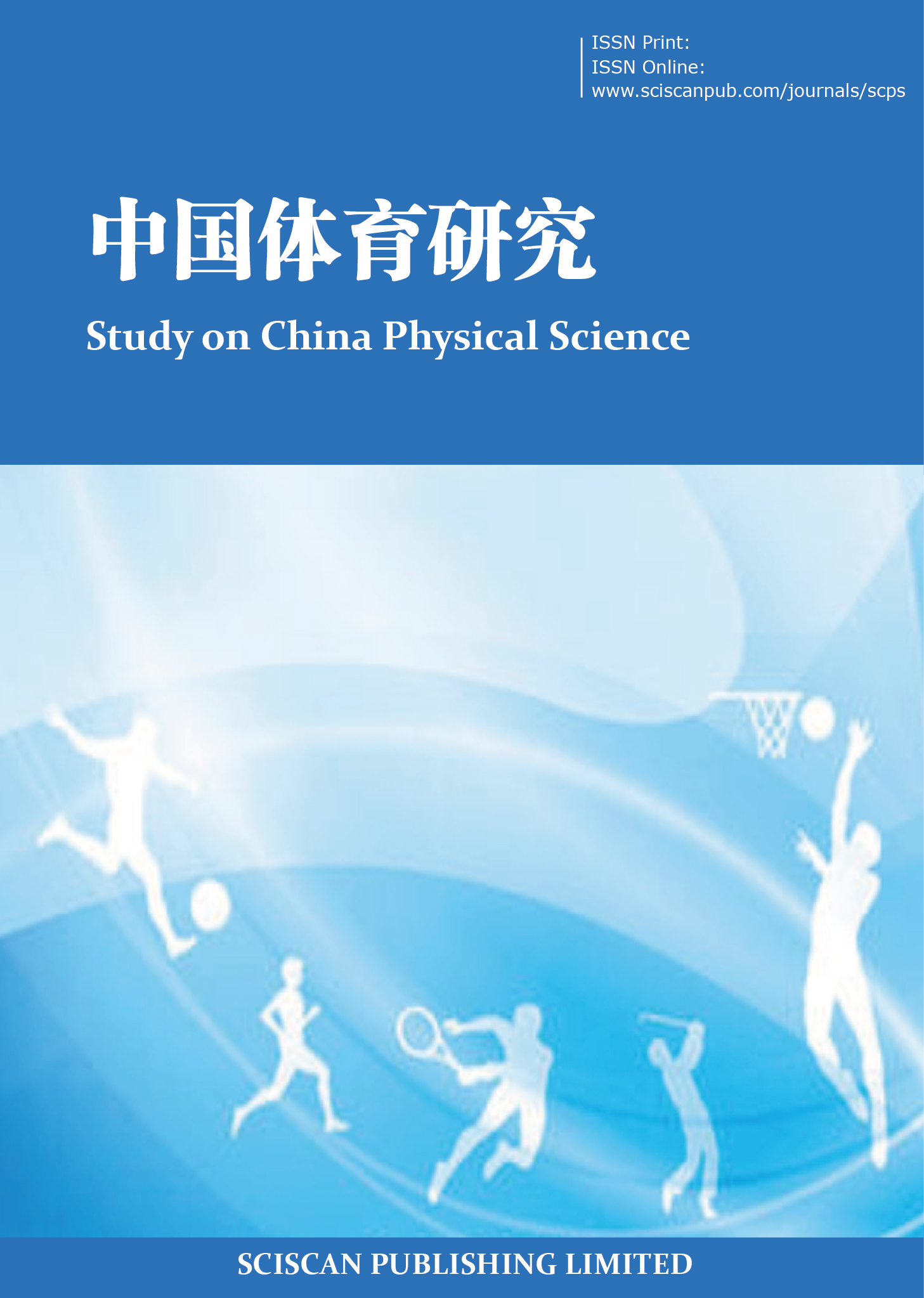Study on China Physical Science
从PIN结合论的视角论体育实践课教学的几个基本问题
Discussion on Several Theoretical Problems of P.E. Practice Teaching From the Perspective of PIN— Binding Theory
- Authors: 荣敦国¹ 刘广新²
-
Information:
1. 上海商学院体育健康学院,上海; 2. 浙江理工大学艺术与设计学院,杭州
-
Keywords:
P.E. practice teaching; PIN-Binding theory; Sports intelligence; Sports non-intellectual factor; Physical ability; Athletic ability体育实践课教学; PIN 结合运动训练理论; 运动智力; 运动非智力因素; 体能; 运动能力
- Abstract: “Why to teach, what to teach, how to teach and how much to teach” is the core issue of scientific control in P.E. practice teaching. In order to improve the teaching efficiency of all kinds of P.E. practice courses at all levels, on thebasis of studying the traditional teaching theories of domestic and foreign research, this paper puts forward its own views on some important issues in the teaching of P.E. practice courses from the perspective of PIN-binding theory. The main points of this paper are as follows: (1) From the perspective of variable control, the teaching activities of physical education practice course can be divided into three categories: Physical development, sports intelligence development, and sports non-intelligence factor training. Moreover, PINbinding P.E. practice teaching should be the basic physical education teaching mode. (2) According to PIN-binding theory, there are five physical education teaching principles: subjectivity, success, synergy, development and creativity, all of which belong to the P.E. practice teaching principle of PIN-binding. (3) The PIN-binding theory also explains the important issues such as the development system of students’ athletic ability, physical ability system, Sports intelligence system, Sports non-intellectual factor system, and model of the students’ athletic ability development. “为何教、教什么、怎么教和教多少”是科学把控体育实践课教学活动的核心问题。为提高各级各类体育实践课的教学效益,在学习研究国内外传统教学理论的基础上,本文从PIN 结合运动训练理论的角度,对各级各类体育实践课教学的若干重要问题提出了自己的看法。本文的主要观点是:(1)从变量控制的角度,可将体育实践课的教学活动划分为:体能发展、运动智力开发、运动非智力因素培养三大类,并且,PIN 结合的体育实践课教学是基本体育教学模式。(2)根据PIN 结合论,体育实践课教学活动有:主体性、成功性、协同性、发展性和创造性5 条体育教学原则,都隶属于PIN 结合的体育实践课教学原则。(3)PIN 结合论也对学生运动能力的发展系统、体能系统、运动智力系统、运动非智力因素系统、学生运动能力发展模型等重要问题进行了阐释。
- DOI: https://doi.org/10.35534/scps.0303025
-
Cite:
荣敦国,刘广新.从PIN 结合论的视角论体育实践课教学的几个基本问题[J].中国体育研究,2021,3(3):303-318.
1 PIN结合论概述
20世纪80年代初,我国教育心理学家燕国材教授首次提出“非智力因素概念”,《华东师范大学学报》曾辟专栏进行非智力因素大讨论。三十多年来,非智力因素理论的提出极大地推动了我国教育教学改革,并取得很好的成效。多年来,笔者一直致力于学习研究“非智力因素”,并努力将非智力因素理论引进竞技体育领域,以提高训练成效,争取多、快、好省地培养出优秀运动竞技人才、多出优异运动成绩。智者千虑必有一失,愚者千虑或有一得。受美国心理学家勒温提出的行为公式B=f(PE)和燕国材教授提出的智力和非智力结合学习理论—IN结合论的启发,笔者于2005年在《北京体育大学学报》发表文章,提出了旨在探讨运动训练过程的本质,寻求运动训练学和心理学契合点等问题的“PIN结合的运动训练理论”(简称PIN结合论)。PIN结合论认为,影响一个运动员运动训练成功的因素很多,但归纳起来,不外乎外部因素(外因)和内部因素(内因)两大系列。外部因素指的是影响运动训练的一系列客体的环境条件因素,可用“E”(Environment)来表示;内部因素是指影响运动训练的一系列运动员主体方面的身心因素,它包括:体能因素“P”(Physical Ability)、智力因素“I”(Intelligence)和非智力因素“N”(Non-intelligence)三个方面的因素。PIN结合论认为,这些主客体因素对运动训练活动的影响是不同的,它们与运动训练成功“A”(Achievement)的关系,可用如下的一个公式:“在其它条件基本相同的情况下,A=f(PIN)”来表示,这里的“其它条件”指的是外部客体条件即“E”因素。这个公式的意思是说,假定外因基本一致,那么,每个运动员运动训练活动的成功归根结底可由体能(P)、智力(I)和非智力(N)三者的函数关系“f”来表示,或者说,运动员运动训练竞赛活动的成功是由其体能(P)、智力(I)和非智力(N)共同决定的。当初向竞技体育界提出这个成功公式的目的是试图强调E、P、I、N四因素在运动训练竞赛活动中的关系及其作用。经过多年的实践和进一步研究,PIN结合论对具体的运动训练竞赛活动的实践指导和归因分析都有极其重要的指导意义。因为PIN结合论秉持的是系统论、重点论、协同论等先进、务实理念分析、研究竞技体育一般运动训练理论问题,不满足于经验主义和教条主义的思维方式和做法,注重并强调发挥运动员主体的综合身心因素提升他们的竞技能力和制胜力,受到越来越多业内人士的关注与好评。PIN结合论所涉及的问题和观点是多角度,多层次的,尤其,对运动训练活动的性质、运动训练过程的本质、运动训练涉及的变量、运动训练的原则和运动训练策略等基本而重要的竞技体育问题都提出了自己的观点。
2 PIN结合论对体育实践课教学活动几个基本问题的观点
体育实践课教学活动,虽然不同于一般的学生的文化知识的教学活动,始终有学生身体活动的参与是其显著特点,但与运动员的运动训练活动在组织形式、方法、手段等很多方面具有高度的相似性、甚至是一致性,两者的最大不同在于目的和任务方面。运动员进行运动训练竞赛活动的主要任务是不断发展竞技能力,而一般学生的体育实践课活动则聚焦于如何有效发展学生的“运动能力”。PIN结合运动训练理论是研究在运动训练竞赛活动中如何发展与发挥运动员竞技能力问题的理论,它关心的核心问题是“为何练、练什么、怎样练、练多少”,研究对象或训练的对象即主体是“运动员”。各级各类体育实践课教学活动的教育对象是学生,搞好一切体育实践课教学活动应关注的核心问题则是“为何教、教什么、怎么教、教多少”,两者在关注的核心问题上具有高度的相似性。除了在教育对象、教育目的和任务等方面有差异外,两者在教育形式、条件、方法与手段等方面也具有高度的相似性和一致性。鉴于从事体育教学三十年的经验和对PIN结合运动训练理论的把握,笔者深刻认识到体系化的PIN结合论可对体育实践课教学活动应关注的若干基本问题进行分析与指导。本研究的目的就在于把PIN结合论引进一般的体育实践课教学领域作为教育理论和行动指南,促进各级各类体育实践课教学活动质量和效益的提升。本文就从以下几个方面展开重点阐述:
2.1 体育实践课教学活动与学生心理活动的关系
非智力因素理论的心理二分法,即把人的心理活动划分为智力因素和非智力因素两大系统,并且智力因素系统和非智力因素系统具有互动的辩证关系是PIN结合论的重要立论依据。依据PIN结合论对运动员的运动训练竞赛活动与运动员心理活动的关系观点,可推知,体育实践课教学活动与学生心理活动的关系,见图1:

图 1 体育实践课教学活动与学生心理活动的关系
Figure 1 The relationship between P.E. practice teaching activities and students’ psychological activities
依图1,体育实践课教学活动和学生心理活动具有密切关系,学生的一切外显的体育活动都以学生内隐的特定心理活动为基础。
2.2 体育实践课教学活动中学生运动智力和运动非智力因素的互动关系
根据体育实践课教育活动中学生的心理活动特点,PIN结合论认为,体育实践课教学活动在发展学生运动能力的过程中,学生的运动智力和运动非智力因素具有如下的互动模式,见图2:

图 2 体育实践课教学活动中学生运动智力和运动非智力因素的互动模式
Figure 2 The interactive mode of students’ sports intelligence and sports non-intellectual factor in P.E. practice teaching
根据教学经验,在各种各样、具体的体育实践课教学活动中,存在相互作用的两条心理流,即运动智力流和运动非智力因素流,在某一时刻总是某一运动智力因素或者某一运动非智力因素占据主导优势,发挥认识作用或意向作用。学生的运动智力和运动非智力因素总是交替、缺一不可地共同发挥各自功能与作用,以不断推动体育学习活动的持续进行。了解这一点,对于根据教学需求和具体心理因素的特点,调动学生的具体心理因素完成教学任务、阅读理解学生体育学习过程中的种种表现,正确归因是十分重要的。体育教学水平的高低,其实在很大程度上,就在于体育教师对学生纷繁复杂心理因素的了解和动态掌控与应用上。
2.3 PIN结合论对体育实践课教学活动的教学变量与教学类型的观点
2.3.1 体育实践课教学活动的教学变量问题
了解体育实践课教学活动的变量问题,首先有利于从全局上把握影响体育实践课教学活动的各项因素,并且了解它们的归属与性质,这对于根据具体教学任务和目的进行目的性和针对性强的教学设计是前提性的。根据PIN结合论,影响体育实践课教学活动成效的因素包括主体因素和客体因素两方面。在客体方面,主要有教学设施、教学环境、体育实践课教学氛围、体育教师教学水平、家庭条件和人际关系等。在主体方面,包括学生的心理因素和体能因素两方面。因此, PIN结合论认为,学生运动能力系统的第三层次是由狭义的体能(P)、运动智力(I)和运动非智力(N)三大因素系列构成。在实际的体育实践课教学活动中,学生的这三大因素系统所发挥的作用是不同的。一般来讲,学生的体能因素对体育教学活动的影响是直接的,起基础性的支持作用,属于物质基础—支持系统;运动智力因素对体育教学活动的影响也是直接的,起认识性作用,属于执行—操作系统;运动非智力因素对体育实践课教学活动的影响一般是间接的,起意向性作用,属于动力—调节系统。在体育实践课教学活动中,学生的这三大主体因素彼此之间是互动关系,共同影响着具体体育实践课教学活动的进程。
综合主体和客体两方面的因素,影响体育实践课教学活动的变量可归结为四个系统:环境因素系统(E)、体能因素系统(P)、运动智力因素系统(I)和运动非智力因素系统(N)。由于这四个系列的变量对一切体育实践课教学活动都有一定的影响和作用,而且彼此之间具有相互促进和相互促退的辩证关系,所以,PIN结合论认为:“在其它条件基本相同的情况下,A=f(PIN)”这一表达公式对于体育实践课教学活动也是适用的,只不过“A”指的是学生运动能力的发展(或取得的成功)而不是运动员竞技能力的发展(或取得的成功)。由此,体育实践课发展学生运动能力的教学行为可描述为:“在其它条件基本相同的情况下,A=f(PIN)”。从体育实践课教学活动的角度,这个公式表达了三层意思:一是,它包含了所有的体育实践课教学变量;二是由于“E”变量很难由学生来控制,因而也用“在其它条件基本相同的情况下”来加以限制;三是,P、I、N三因素在体育实践课教学活动中是辩证的互动关系,因此,用数学上的函数关系“f”来表示。在此借用PIN结合论这一表达公式的最终目的就是试图克服西方“认知派”“行为联结派”和“人本派”三大学习理论在对待学习变量问题上的各执一端的片面性,并紧密结合体育实践课教学活动实际,把E、P、I、N四大系列因素辩证地统一起来。当然,在实践中要真正做到这一点,并非易事,还需要从理论和实践等方面进行大量的实证探索。
2.3.2 体育实践课教学活动的类型
从参与发展学生运动能力的各个系统的角度,PIN结合论认为,各级各类体育实践课教学活动可分为以下三大类:
(1)以发展学生体能为主导的体育实践课教学活动
PIN结合论认为,体育实践课教学肩负着积极促进学生体质提升的重任。要增强学生的体质又必须以发展学生的运动能力为载体。要发展学生的运动能力又需要以学生的体能发展为主要抓手,体能发展教学是体育实践课的重要任务之一。学生的体能系统是学生运动能力系统的“物质基础—支持系统”,对一切体育实践课教学活动都起着基础性的支持作用。学生的体能发展水平既是一切体育实践课教学活动发展学生运动能力的前提条件,同时,又是进一步发展学生运动能力的手段和重要教育目标。根据PIN结合论,发展学生运动能力的体能系统的结构模式,见图3:

图 3 影响体育实践课教学活动的学生体能系统指标体系
Figure 3 The index system of students’ physical ability system which affects the teaching activities of physical practice course
值得一提的是,到目前为止,“体能”这一概念仍存在较大的争议。参照《运动训练学》,PIN结合论认为, 学生的“体能”因素(P)有广义与狭义之分。广义“体能”是指学生的身体能力,是学生身体能力的简称,包括身体形态、身体机能和运动素质三个方面;狭义的“体能”即通常所说的体能(或体力)是指学生各项运动素质在身体活动中综合表现出来的运动能力。身体形态是学生身体机能和运动素质的外在的静态表现,是学生体能的解剖学基础;身体机能是运动素质的生理基础。要发展、改善学生的身体形态指标和身体机能指标,排除遗传因素和营养因素外,在很大程度上,必须依靠采取有效的专门的运动方法和手段发展学生的运动素质才能实现。
(2)以开发学生运动智力为主导的体育实践课教学活动
PIN结合论认为,学生的运动智力系统是其运动能力发展的“执行—操作”系统,对体育实践课学习活动包括体能发展和非智力因素培养活动都起着认知或认识的作用。从学生的运动智力因素系统的下一层次上讲,可包括运动记忆、运动观察(即运动感知)、运动注意、运动想象和运动思维五大因素。根据教学经验,在体育实践课教学中如何借助体育手段开发学生的运动智力是一个重点,也是一个难点。传统的《心理学》把人的心理活动划分为:心理过程(包括知、情、意、行)和个性心理(包括能力、气质和性格)。以传统心理学这一心理二分法为基础构建的《体育心理学》,也没有对支撑学生从事体育活动的运动智力系统给出清晰、系统的构架。这一缺憾,无疑,对于具体体育实践课教学活动的任务确定和教学设计带来一定实际困难。为便于借助体育手段开发学生运动智力,笔者在前期研究中通过编制问卷:《影响学生运动能力发展的重要运动智力因素的专家调查》,以该问卷为工具,对45位体育专家进行了问卷调查。按照非常重要、比较重要、不重要分别记3分、2分、1分的赋值方法进行均数统计,截取了得分较高的10项具体运动智力因素,见图4:

图 4 影响体育实践课教学活动的10项具体运动智力因素指标体系
Figure 4 The index system of 10 specific sports intelligence factors that affect the teaching activities of physical practice course
依图4,从结构上看,这10项具体运动智力因素涵盖学生运动智力因素系统第二层次的五大因素。在具体的体育实践课教学活动中,以体能发展教学、技术教学、战术教学,技战术能力发展教学等为手段、载体即可将抽象,难以从总体上把握的开发、挖掘学生的运动智力落到实处。在具体的体育实践课教学活动中,学生的各项具体运动智力因素既是具体教学活动的教学目标,又是达成各种教学目的、目标的手段。能否全面的、准确的发展学生的运动智力在很大程度上是衡量一个体育教师教学艺术水平高低的一个重要指标。
(3)以培养学生运动非智力因素为主导的体育实践课教学活动
PIN结合论认为,学生的运动非智力系统是其运动能力发展系统的“动力—调节”系统,对学生体育实践课学习活动包括体能发展和运动智力因素开发活动都起着动力、定向、引导、维持、调节、强化或补偿等方面的作用。学生的运动非智力因素系统从第二层次上讲,可包括运动动机、运动兴趣、运动情感、运动意志和运动性格五大因素。为便于通过体育实践课教学活动有效培养学生运动非智力因素,笔者在前期研究中通过编制《影响学生运动能力发展的重要运动非智力因素的专家调查》问卷,以该问卷为工具,也对45位体育专家进行了问卷调查。按照非常重要、比较重要、不重要分别记3分、2分、1分的赋值方法进行均数统计,截取了得分较高的10项具体运动非智力因素,见图5:

图 5 影响体育实践课教学活动的10项具体运动非智力因素指标体系
Figure 5 The index system of 10 specific sports non-intellectual factors that affect the teaching activities of physical practice course
依图5,我们便较有把握的从整体上,系统并有重点的对学生进行非智力因素的培养了,这也是在认识到“为何教”的前提下,把“教什么、教多少”落到实处的关键一环。据此,我们可以根据教学任务,选择、调用相应的运动非智力因素,发挥它们在具体体育活动中的“动力—调节”功能,确保教学目的与任务的完成。PIN结合论认为,同运动智力因素一样,在体育实践课教学活动中,学生运动非智力因素,既是体育教学可以调用的心理因素,也是体育教学目的。较一般文化课,体育实践课教学活动在培养学生良好的非智力因素方面具有更全面、更有针对性等独特优势。
2.3.3 PIN结合论对学生运动能力系统与发展模型的观点
(1)学生的运动能力发展系统
PIN结合论认为,各级各类体育实践课教学活动的顺利开展都离不开学生的体能(P)、运动智力(I)和运动非智力因素(N)系统,它们在具体的体育实践课教学活动中是相辅相成,相互促进、缺一不可的有机统一。综合学生体能系统、运动智力系统和运动非智力因素系统,学生运动能力的构成系统见图6:

图 6 体育实践课教学活动中学生运动能力系统的结构模式
Figure 6 The structure model of students’ sports ability system in P.E. practice teaching activities
依图6,要全面、系统、科学化地发展学生的运动能力需充分考虑学生体能、运动智力和运动非智力因素系统的各项影响因素发展水平,还要有依据学生的以上各系统因素发展水平科学化地确立体育实践课教学活动的目的、任务与方法与手段。一般来讲,学生的具体体能发展、具体运动智力开发、具体运动非智力因素的培养,都不是“单打一”的活动,三者既是教学手段,又是教学目标、任务。
(2)学生运动能力的发展模型
为生动形象地揭示,并强调影响学生运动能力发展的三大因素系统密切的、动态的、互动的辩证关系。PIN结合论认为,学生运动能力系统的发展模型,见图7:

图 7 体育实践课教学活动中学生运动能力的发展模型
Figure 7 The development model of students’ sports ability in P.E. practice teaching activities
依图7,在具体的体育实践课教学活动中,学生的体能因素、运动智力因素和运动非智力因素都处在不断的动态变化过程中,它们的共同作用和变化一直在动态地影响着学生运动能力的发展成效。一般来讲,有四种情况:一是, P>N>I。在各种各样的以体能发展为主的教学活动中,毫无疑问,需要学生投入较大的是体能,并且,需要有效调动其学习动机、运动毅力、情绪稳定性、运动激情等有效运动非智力因素作为动力、调节支撑;二是,I>N>P。这种情形在运动知识传授、运动技战术学习等体育实践课教学活动中是普遍存在的。在不论是运动知识的传授、还是运动技术、战术等内容的学习过程中,在学生的学习动机、自信心或好胜心等非智力因素的动力、调节下,学生才能充分调动、发挥自己的节奏感、动觉表象、动作思维或形象思维等运动智力因素不断推动这些活动的有效进行。根据经验,技战术学习时必须在保证学生体能充沛的情况下充分发挥学生的运动智力才能取得好的运动学习效果;三是,N>P>I。在动之以情、晓之以理的前提下,利用某种具体体能发展手段刻意磨炼学生的毅力、自信心、责任心、好胜心等优秀非智力因素是有经验的体育教师的惯用做法;四是,P=I=N。根据教学经验,这种情况有,但不多见,只有在具体的体育实践课教学活动中学生的体能因素、运动智力因素和运动非智力因素达到互相映衬、相辅相成,默契、和谐状态时才会出现。这时学生的运动体验将达到一种身心的和谐、愉悦,甚至是达到个人的一种运动巅峰状态,这时的教学效果是非常好的一种完美状态。
2.4 PIN结合论对体育实践课教学原则的观点
体育教学原则是根据学生体育学习规律提出的。上述从PIN结合运动训练理论的视角审视体育实践课教学活动的变量、体育实践课教学活动的类型分析、学生运动能力系统构成模型、学生运动能力的发展模式等重要问题的探讨,实质上就是对体育实践课教学规律的探索。不论是国外各学习理论流派在其学习理论体系中归纳出的一些学习原则,还是目前国内外运动训练学中概括归纳的一些运动训练原则,对于我们思考体育实践课教学活动的教学原则都有很大的启发作用。基于对体育实践课教学活动的以上基本问题的独特见解,提出如下五条体育教学原则:(1)主体性原则。学生是体育实践课教学活动的唯一主体。这一教学原则的基本涵义就是在体育实践课教学活动中要尊重学生的主体地位,发挥学生的主体作用,调动学生的一切身心因素投入体育学习活动之中并获得共同、协调发展。在这三句话中,第一句是体育教学活动的前提;第二句是手段;第三句是目标。总之,只有尊重、相信、理解、关心和爱护学生,才能调动他们的一切身心因素,取得理想的体育教学效果。(2)成功性原则。绝大多数的学生都具有中等或中等以上的运动智力水平,如果再加上非智力因素和体能因素相应的发展和培养,那么,每一个学生都能获得在运动能力方面的一定的成功。在此,提出并强调体育教学的成功性原则,就是要反对长期以来的“天赋决定论”“身体素质决定论”“智力决定论”等极端片面的观点和做法。实践证明,每一个学生只要认识到,并积极做到P、I、N三大主体因素有机结合,在体育教学活动中都会取得应有的成功。(3)发展性原则。影响学生运动能力不断进步和发展的主体因素是运动智力因素、运动非智力因素以及体能因素。这三大因素既是体育实践课教学活动的基础,也是体育实践课教学活动的重要教学任务。一切技术能力、战术能力、心理能力和体能的发展都离不开它们的有机结合和协调发展。因此,要贯彻发展性原则,最根本的就是把P、I、N三因素的发展统一于体育实践课教学活动之中,用学生的P、I、N三因素是否在体育实践课教学活动中共同获得了充分的发展为标准,来评估教学效果。(4)协同性原则。体育实践课教学活动内部诸因素之间及其与外部诸因素之间,也必须保持和谐统一、协同合作,才能保证体育实践课教学活动得以有效开展,完成既定的教学任务。要有效贯彻协同性原则,还要求创设和谐、融洽、团结、合作、奋进的体育教学氛围,建立相互尊重、相互理解、相互信任的人际关系。现在国内外体育教育界,越来越认识到良好的教学氛围和人际关系不仅是搞好体育教学的前提条件,而且也是影响体育教学效果的一项重要因素。(5)创造性原则。每个学生都有一定的创造潜能,只要有一定的条件作保证,使其得到有效地培养和发挥,就能把他们培养成体育活动中的不同层次的创造者。心理学研究证明,创造力既与智力有关,更与非智力有关。从某种意义上讲,体育教学的过程就是不断突破学生运动能力进展缓慢或停滞不前的过程,要冲破前进道路上的各种困难与壁垒,非常需要发挥学生这一教学主体的创造能力。因此,顺应现代体育实践课教学活动的发展趋势,必须高度重视发展学生的运动智力和运动非智力因素水平,提高他们的自我创新能力。
另外,体育实践课教学活动的基本原则应是P、I、N三因素有机结合,协同发展原则。上面提出的五条体育教学原则是这一基本教学原则的分解与细化。如果把体育实践课的所有教学原则看成一个系统的话,那么以上五条教学原则则属于基本体育教学原则的亚层次。
3 结语
(1)从实现条件、途径、方法和手段等方面看,体育实践课发展学生的运动能力和竞技体育活动发展运动员的竞技能力具有高度的相似性,因此,PIN结合运动训练理论也可修改、完善为“PIN结合的体育教学论”。
(2)发展学生运动能力的体育实践课教学行为可描述为:“在其它条件基本相同的情况下,A=f(PIN)”。这个公式表达了三层意思:一是,它包含了体育实践课的所有体育教学变量;二是由于“E”变量很难由学生来控制,因而也用“在其它条件基本相同的情况下”来加以限制;三是,P(体能)、I(运动智力)、N(运动非智力因素)三因素在体育实践课教学活动中是辩证的互动关系,所以用数学上的函数关系“f”来表示。
(3)体育实践教学活动可分为:以体能发展为主的体育教学活动、以开发学生运动智力为主的体育教学活动、以培养学生运动非智力因素为主的体育教学活动三大类。由于任何体育实践课教学活动都需要学生身心因素的积极投入,以上三类体育实践课教学活动只是课程任务的侧重点不同,它们都隶属于PIN结合教学,不可顾此失彼,薄此轻彼,因此,PIN结合的体育教学是基本的体育实践课教学模式。
(4)各级各类和不同性质与任务的体育实践课教学活动,都需遵循的教学原则有:主体性原则、发展性原则、成功性原则、创造性原则、协同性原则。体育实践课教学活动的基本原则应是P、I、N三因素有机结合,协同发展原则。
参考文献
[1] 燕国材.教育十论—我对教育问题的一些基本看法[M].北京:中国建材工业出版社,1998:124-183.
[2] 田麦久.运动训练学[M].北京:人民体育出版社,2000 :184.
[3] 燕国材,马家乐.非智力因素与学校教育[M].西安:陕西人民教育出版社,1992:29-30.
[4] 燕国材.非智力因素与学习[M].上海:上海教育出版社,2006:14-16.
[5] 荣敦国,刘一民.析PIN结合运动训练理论[J].北京体育大学学报,2005,28(2):256-259.
[6] 燕国材.研究性学习之辨析[J].上海教育科研,2004(6):10-14.
[7] 燕国材.关于IN结合论的十对命题[J].心理科学,2001(5):519-522.
[8] 徐本力.运动训练学[M].济南:山东教育出版社,1990:193-219.
[9] 刘大庆.运动员竞技能力非衡结构补偿理论[J].体育科学,2000(1):43-46.
[10] 刘大庆.运动员竞技能力结构功能补偿现象研究[J].武汉体育学院学报,1999(1):94-97.
[11] 王小燕,卞军风.追根溯源找寻教育学与心理学的契合点[J].国家教育行政学院学报,2006(8):8-15.
















